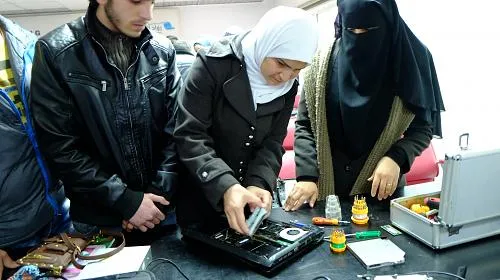AMMAN—(March 15, 2016)– Five years of war have left Syrian women under immense pressure as they struggle to fill gaps in family income and deteriorating public services, says a new report from CARE.
The report, “Women, Work and War” highlights the impact of war on Syrian women’s struggle to provide for their families, and the risks in doing so.
“Women are stepping up, because they must,” says Salam Kanaan, Country Director of CARE Jordan. “They are assuming the role of breadwinner, particularly in female-headed households. Other women walk a tightrope between generating income and managing the disapproval of their husbands or male relatives – as traditionally, men were the main wage-earner. ”
In pre-crisis Syria, only 22 percent of women participated in the formal workforce. But as men leave home to fight, are killed, or return to Syria from neighboring countries, more responsibilities are falling to women. Currently in some areas of Syria, almost 20 percent of households are female-headed says CARE, signaling a dramatic shift in the role of women in this crisis.
“In parts of Syria, cut off from water, fuel and medicine, women walk long distances to carry fire wood, or fetch water. They face sniper fire crossing frontlines as they smuggle essential medical supplies into besieged areas,” says Richard Hamilton, Director of CARE’s Regional Syria Response.
The shifting gender dynamics plays out further when Syrians leave to enter neighboring countries as refugees, where up to 35 percent of households are headed by women, according to the UN. Here, it is the men that frequently struggle to find work – often because they are discriminated against due to their refugee status. For women, this can pose even greater threats of sexual harassment and exploitation.
“Not only are there risks for women in the workplace, but there is the additional threat in the home that the changing roles and demands on women will increase family tensions, or worse, domestic violence. With the economic balance of power shifting within the family, some men feel unable to support their families and become increasingly frustrated,” explains Kanaan.
“We need to work with communities to ensure there is support for women as they seek to contribute to family incomes, and that specific support for women does not trigger backlash,” Kanaan says. CARE Jordan has, for example, developed vocational training courses such as computer and mobile phone repair that brings together Syrian and Jordanian women and men to teach them skills and to encourage social cohesion.
With the UN Commission on the Status of Women taking place in New York this week, CARE is calling for increased attention to the needs of women in emergencies by ensuring that women are given the voice and space to become an active part of the solution. “Agencies too often make assumptions about the capacity and willingness of women to pursue different livelihoods or education opportunities,” says Hamilton. “Women in besieged communities have told our partners that they need fewer tailoring classes and more first aid and disaster response workshops. We need to listen to them.”
-ENDS-
Media contact: Holly Frew hfrew@care.org +1.404.979.9389
About CARE: Founded in 1945, CARE is a leading humanitarian organization fighting global poverty. CARE has more than six decades of experience helping people prepare for disasters, providing lifesaving assistance when a crisis hits, and helping communities recover after the emergency has passed. CARE places special focus on women and children, who are often disproportionately affected by disasters. To learn more, visit www.care.org.

